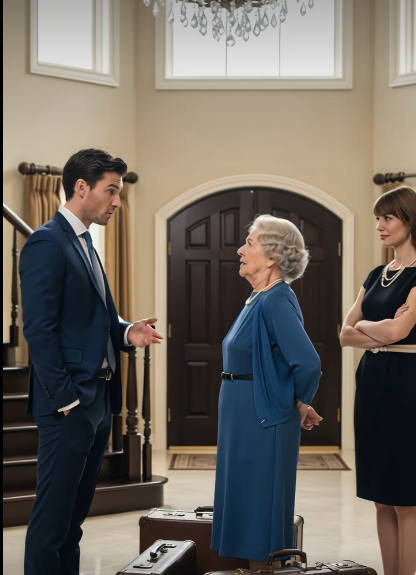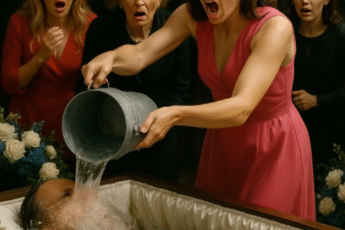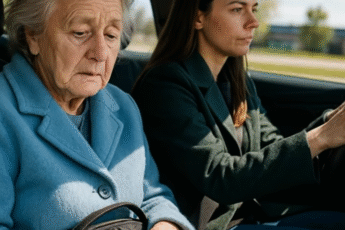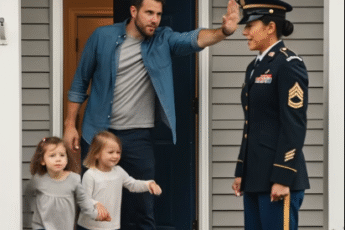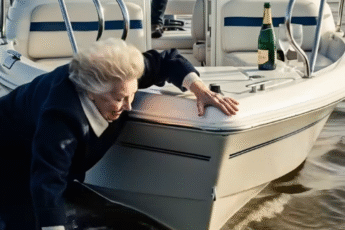The lawyer’s voice cut through the stillness of the room, every word sinking into me like a weight. “The family residence and all primary assets go to Caroline Mercer.”
My daughter, Caroline, reached for her husband Grant’s hand. They smiled, their satisfaction bold and unashamed, as though this was the victory they had waited for their entire lives. I kept my face a steady, placid mask—the one I had perfected over forty-two years of marriage to a powerful man. Surely Ray had left something more for me. Surely this wasn’t all.
The lawyer cleared his throat, his tone clipped and final. “And to my wife, Martha Hale, I leave the property in Colorado, near the national park.”
That was it. Caroline leaned back in her chair, her eyes wide with a delight she barely tried to conceal. The silence in the room became a roar in my ears. I felt every gaze turn toward me, a mix of pity and morbid curiosity, waiting for the sixty-eight-year-old widow to crumble. But I gave them nothing. What I felt in that moment could not be spoken aloud.
Caroline was quick to fill the silence with her own brand of suffocating generosity. “Of course, Mother can stay with us. At least until she gets settled,” she said smoothly, patting Grant’s arm as if the two of them were saints offering me charity. The room nodded along, relieved. But I could feel the edges of the trap closing in.
Two weeks later, I understood exactly what her “kindness” meant. The home that had once been mine was now a stage where I played no role. My bedroom was reduced to the guest room at the end of the hall. My seat at the head of the dining table was gone, replaced by Caroline’s carefully arranged centerpieces and Grant’s booming voice. I cooked the meals. I cleaned the dishes. And when their friends arrived for cocktails, I was expected to stay out of sight. I was no longer the heart of the household, but a shadow that moved silently through its corners.
One evening, as the last guest’s laughter faded, Grant cornered me in the kitchen. He swirled bourbon in one of Ray’s old crystal tumblers, a glass I hadn’t seen in years. “This isn’t working, Martha,” he said, his voice low.
I kept my hands busy scraping food from plates into the trash, pretending his words were just background noise.
“You were carried your whole life,” he continued, leaning on the counter. “Ray did it. Caroline does it now. But we need our space. Independence will be good for you.”
The word “independence” landed like a stone. What he really meant was exile, and I knew it.
The next morning, I opened my bedroom door and stopped short. Two suitcases—my suitcases—were sitting in the hallway, zipped and waiting like obedient dogs. Caroline appeared behind me, her smile carefully composed. She kissed my cheek as though nothing were unusual.
“Mother, we think it’s time. You should go see what Dad left you. It’s your place now.”
Grant followed, a sealed envelope in his hand. He pressed it into mine with smug finality. “Directions to the cabin. The keys are inside. Don’t come back until you’ve figured out how to stand on your own two feet.”
“We’re not running a charity here,” Caroline added softly, as if to soften the blow. “It’s for your own good, Mom. You’ll thank us one day.” Her hug was stiff, rehearsed, already finished before it began.
At sixty-eight years old, I walked down the steps of my own home carrying the remnants of my life. I loaded the bags into the modest sedan Ray had bought me three years earlier, a car that now felt like my only lifeline. The house I had helped design, the family I had raised—all of it stood behind me like a locked door. And for the first time in decades, I had nowhere to return to.
The drive stretched across the day, each mile heavy with questions I couldn’t answer. I left Helena Ridge behind, the only town I had ever called home, and followed the directions Grant had given me. For hours, the highway carried me through endless plains and winding foothills until pavement gave way to gravel, and gravel thinned into a rutted dirt path. My phone signal vanished, as if the world itself had decided to abandon me. The last thirty minutes were nothing but switchbacks carved into the side of a mountain, each turn steeper and lonelier than the one before.
Finally, the cabin appeared, slouched at the edge of the trees. A sagging porch leaned toward the ground. Shingles were missing from the roof. Windows were cracked and patched with boards. It looked like the kind of place you passed quickly, not one you entered. I parked in front of it, my heart a heavy stone in my chest. Ray, why here? I whispered into the stillness.
I forced the rusted key into the lock. The door groaned on its hinges as if it hadn’t opened in years. I braced myself for cobwebs and dust, but what greeted me was nothing I expected. The cabin’s interior glowed with a soft, warm light. Hardwood floors gleamed beneath plush rugs. A leather sofa faced a stone fireplace already set with logs. The kitchen sparkled with stainless steel appliances that looked as though they had just been polished.
I froze in the doorway, my suitcase slipping from my hand. The table near the window was set for one. A plate with crumbs of bread, a mug half-full of coffee, and a notebook left open, as if someone had just stepped out for a moment. The handwriting inside the notebook made my breath catch. Precise, slanted script I knew better than my own. Ray’s.
I turned to the date at the top of the page. It was from three days ago.
My knees weakened, and I gripped the back of a chair to steady myself. Ray had been gone, buried, mourned for weeks. Yet here was his hand, alive on paper, alive in the smallest details of this impossible room. The entry was brief but chilling: Martha will be arriving soon. Everything must be in place. God, I hope she understands.
The walls seemed to lean closer, holding secrets I wasn’t ready for. I wandered deeper into the cabin. A study sat with papers spread across a desk. A bedroom held rumpled sheets, the imprint of a body not long gone. In the corner, a bookshelf stood slightly ajar. I reached for it hesitantly. It swung outward with surprising ease, revealing a narrow passage lit by a faint strip of bulbs along the floor.
The small chamber beyond looked like something from a spy thriller. The walls were covered with photographs, maps, and newspaper clippings, all connected by pins and colored string. At the center of this web was Grant Mercer. Notes in Ray’s handwriting covered the margins: account numbers, dates, cryptic arrows pointing from one name to the next. Offshore accounts. Shell companies. Payments tucked neatly into the shadows of legitimate deals.
In the middle of the desk sat a sealed envelope, my name written across it in Ray’s familiar hand. With trembling fingers, I tore it open.
My dearest Martha, it began, if you’re reading this, then you’ve found the truth. I’m sorry for the pain and confusion this has caused you. But what I’m about to tell you will sound impossible. I’m not dead. At least, not in the way you believe.
I read the words twice, my eyes refusing to accept them. Ray explained everything: how five years ago, while auditing contracts for Mercer Development, he had discovered money being laundered through government projects—millions skimmed away, hidden behind shell companies. At the center of it was Grant, with powerful allies covering his tracks. Ray wrote how he began gathering evidence quietly but soon noticed he was being followed. Phones tapped. Our home bugged.
I realized I had to disappear before they erased me, he wrote. The staged heart attack, the funeral… it was the only way to survive.
My pulse thundered as the letter offered me a choice. This house contains everything needed to expose them. You can take the files to Agent Ethan Ward in Loveland, or you can use the cash and new identity in the safe and vanish. Whatever you do, don’t trust Caroline. She chose money over morality long ago.
The last line pierced me deeper than any other. I’ve always known you were stronger than anyone believed—even you.
I sat frozen in the hidden room, Ray’s letter clutched in my hands, when I heard it. Tires crunching on gravel outside.
The sound of car doors slammed, more than one. Through a narrow slit of a window, I saw them. Two black SUVs parked in front of the cabin. Men stepped out—not tourists, not hikers. They were trained, deliberate, moving with the silence of hunters. They weren’t here by mistake. They were here for me.
I remembered Ray’s note: This house contains everything you need. My fingers brushed along the desk until I found a small, hidden panel beneath it. With a push, a section of the floor clicked open, revealing a narrow tunnel leading downward.
Voices drifted through the walls, sharp commands, boots on the porch. The front door splintered open. I grabbed the go-bag already waiting inside the passage. Whoever had prepared this had known this day would come. As I slipped into the tunnel, dim bulbs lit automatically, guiding me forward. The air smelled of earth and metal. Above me, heavy footsteps searched for a grieving widow. But beneath their boots, I was already gone.
The tunnel emptied into the woods, half a mile from the cabin. I stumbled into the night, clutching the bag, my breath coming in sharp bursts. Headlights appeared on the dirt road ahead. I froze, ready to dive back into the brush. But the vehicle that slowed to a stop wasn’t a black SUV. It was an old pickup, dented and sun-faded. The driver, a weathered woman in her seventies with sharp eyes and a steady voice, leaned out.
“You lost, ma’am?”
Her name was Nell Whitaker, a ranch owner who had lived in these mountains all her life. Before I could answer, another engine roared in the distance. The black SUVs rounded the bend. One of them slowed, its spotlight sweeping across the trees.
Nell’s eyes narrowed. “Get in. Now.”
Bullets snapped against the tailgate as she slammed the truck into gear. Gravel sprayed behind us, the mountains swallowing us whole as we disappeared into the night.
We ended up at a run-down motel outside a town so small it barely had a name. “Whoever’s after you isn’t playing games,” Nell said, locking the door behind us. “You need someone who can fight back.”
I thought of Ray’s instructions. My hands shook as I pulled the phone from the go-bag. There was one number written on the inside flap of the envelope: Ethan Ward.
When he answered, his voice was calm, clipped. “This is Ward.”
I hesitated. “Ray Hale sent me.”
There was a silence, then a shift in tone—sharper, more alert. “Where are you?”
We spoke in fragments. He confirmed details only Ray could have known: phrases from an old camping trip, the name of a dog we once had. My fear steadied into focus. Ward explained the scope of the operation. Grant wasn’t alone; there was an entire network. Timing was critical. He asked if I wanted protection.
“No,” I said, my voice firmer than I felt. “I don’t want protection. I want justice.”
Dawn crept over the mountains. I stood at the motel window when Ward’s convoy of unmarked SUVs rolled quietly into town. “This is it,” Ward said, sliding a vest over his shirt. “Once it begins, it moves fast.”
From a safe distance, Nell and I watched as the sweep unfolded. At the Mercer home, Grant was pulled from the porch in his robe, fury spilling from him as his hands were cuffed. Caroline bolted through the garden, her hair wild, her bare feet slapping against the stone path. For one tense moment, I thought she might reach the street, but a car blocked her path. She lifted something in her hand, and my breath stopped until I saw it was only a phone. She dropped it when the agents shouted.
Justice doesn’t roar. It arrives in plain cars at sunrise and leaves with nothing more than signatures and silence.
Months later, the courtroom smelled of wood polish and nerves. When my name was called, I walked slowly to the stand. The prosecutor guided me through the story. I described the cabin, the hidden room, the letter. I spoke of the night the SUVs came, of Nell’s truck, of the fear that still woke me in the dark.
Then came the cross-examination. “Mrs. Hale,” the defense attorney said smoothly. “Isn’t it true you were resentful of your daughter’s inheritance?”
“No,” I replied.
“Isn’t it possible that grief distorted your memory?”
I held his gaze. “I remember the sound of gunfire. Grief doesn’t create bullet holes.”
The room stilled. For one brief moment, I looked at Caroline. She avoided my eyes, staring hard at the table in front of her. I wanted to remember her as the child who once held my hand in the grocery store, but the truth sat between us now, undeniable.
The jury returned after two long days. I sat rigid in the front row, Nell’s hand folded gently over mine. The foreman’s voice was even as he read the verdicts, one by one. “Guilty. Guilty. Guilty.”
Grant Mercer bowed his head as if the weight had finally broken his spine. Caroline stood tall, her chin lifted in defiance, but as the counts piled up, her shoulders sagged. When the judge pronounced her sentence—twenty-seven years in federal prison—the air seemed to collapse. There was no triumph, only silence. As the bailiff led my daughter away, she never once looked back.
Months later, I returned to the cabin in Colorado. The house that had lied to me, hidden from me, and nearly destroyed me. But now it was different. The roof no longer sagged. The porch stood straight and welcoming. Inside, light spilled across polished floors. The shadows that once carried fear now felt like corners for rest.
I set up a studio in the spare room, paints and brushes spread across a wide table. For years, I had silenced that part of myself, too busy being a wife, mother, and caretaker. Now, with the quiet of the mountains around me, I began again. I chose to stay, not because I needed to hide, but because I finally understood that survival is more than escaping danger. It is choosing how to live when the danger has passed. Looking back, I see more than betrayal and loss. I see lessons carved into every mile, every bruise, every silence. Independence is not tied to age. At sixty-eight, I learned to stand alone, to fight for truth. And I learned that truth isn’t vengeance. Truth is oxygen. It clears the air so you can finally breathe.
